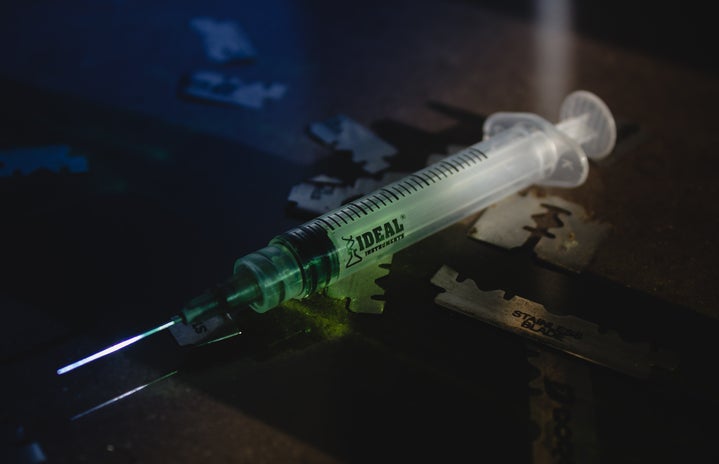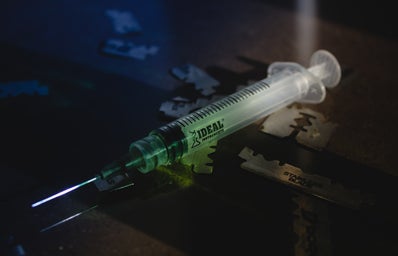50 years ago, American President Richard Nixon came up with one of the most lethal excuses for racism and classism in America. The War on Drugs was supposedly an effort to eradicate drug related crime, part of which was forcing judges to give out strict, mandatory life sentences. This boosted the prison population of America by over 900%, mostly consisting of Black and Latinx drug dealers and users. The only statistic that hasn’t changed today is the rate of drug use.
However, not all Americans have a similar inhumane perspective that the country has become known for. The Oscar nominated Netflix documentary Heroin(e) is the story of three women––a firefighter, a judge and a street missionary––fighting to end the heroin epidemic of Huntington, West Virginia. The film presents a refreshing––and hopeful––perspective on drug users as victims who deserve rehabilitation and patience, rather than punishment.
What sticks out to me the most is the unfamiliarity of these women’s mindsets, given their professions. Necia Freeman is a street missionary who volunteers for the Brown Bag Ministry and gives out food to prostitutes on the streets of Huntington. Throughout the film, we see how many of these women become Necia’s long-time friends. “I love Necia” says Najah Menapace, a recovered heroin addict with the help of Necia. To me, there is so much power in a former prostitute expressing her love for a friend. It goes to show how Necia’s friendship with these girls become their support system during lonely times and in turn, a motivation for sobriety.
Beyond friendship, the compassionate nature of these women helps establish a mutually trusting relationship with one another and the people they help. Patricia Keller is the judge of Huntington’s drug court program. “Honest first, show up second. Then third, try not to use drugs” she says, when defining drug court to a new participant of the program. Patricia believes in establishing trust between her and the participants, and throughout the film, we see her encouraging practices of honesty. “If you’re honest about it, I can work with you”, she reassures a participant who recently had a relapse that he admitted to immediately. Throughout the film, she focuses on honesty and recovery, only sanctioning people who get caught lying or refusing to listen to their parole officers. By doing this, she creates an environment that ensures people that they can mess up and be forgiven, but only if they’re honest and co-operative.
Jan Rader, Huntington’s first female fire chief, is a frontline heroine saving people from overdoses. But beyond being a first responder, she is an activist for increased availability of Naloxone, a chemical that blocks the effect of opiates. Naloxone is a controversial topic because some believe that its increased availability is “empowering the addicts”, but Jan is firmly against the philosophy of viewing medication as something that addicts don’t deserve. “I don’t care if I save someone 50 times. That’s 50 chances to get into long-term recovery.” This quote is my favourite in the whole documentary. It demonstrates the value of every human life with an optimistic approach that every addict can have a sober and successful future. It goes against the more stereotypical perspective of viewing addicts as disposable and incompetent members of society.
The film ends with a heartfelt scene of a graduation ceremony from the drug court program. “You know, coming from the life that I lived, I’d have never thought I’d say this, but I truly believe I made a friend in you for life, a public official”, says one of the graduating participants to Judge Patricia Keller. For me, many of these graduation speeches stand out as proof that the relationship between drug users and government officials is crucial when it comes to ending the drug epidemic in America. Friendship, trust and genuine respect given to human life is what motivates recovery – not arrests and violent encounters.
Taking a look at America as a whole, we need to remember that the lessons we can take from these women are just as applicable to people of colour as they are to Huntington’s majority white population. In states like Louisiana, there are still mandatory sentences being handed out to people who sell marijuana, mostly Black and Latinx dealers. In New York, the abundance of Black and Latinx communities are repeatedly ticketed for possession of Marijuana. From North to South, America’s epidemic of racism won’t let the war on drugs end, whether it be life-threatening heroin or just marijuana.
Some of America’s recent politicians aren’t much different from the 1980s either. President Trump started building a wall to keep drugs out of the country, and called for harsher sentences for drug law violations and the death penalty for people who sell drugs. The value of human life in Huntington is clearly not reflected in the country as a whole, especially when there are people of colour involved. Drug users and sellers are still viewed as expendable members of society who are to be banished to the ever-growing prison population.
Meanwhile on a global scale, we have seen the success of decriminalization laws, such as Portugal’s infamous 2001 decriminalization. The drug-induced death rate in Portugal is now one-fiftieth of the United States. This is the same country where 1% of the population is addicted to heroin, and the HIV rates are the highest in the European Union due to unsanitary needles. The addiction, death and HIV rates have all dramatically reduced by moving people from jails to safe injection sites and drug treatment programs.
There is, of course, hope and successful methods for changing the American statistics. These methods are found both globally and even within small American cities like Huntington. The fierce and inspiring stories of Jan Rader, Patricia Keller and Necia Freeman, along with the success stories of people they’ve helped, make for a must-watch documentary. Beyond just presenting the reality of addiction in poverty-stricken communities, the documentary demonstrates a wholesome example of true girl-power through their brave, yet empathic efforts of saving lives.
These women prove that the first step to recovery always comes down to a change in mindset. And thus, once America realizes that the only true weapon against any drug-related epidemic is compassion, there will be positive change.


